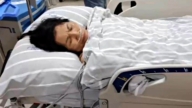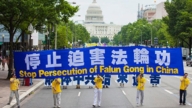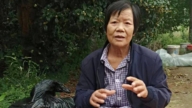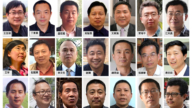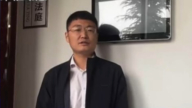【新唐人2014年12月17日讯】1996年,内蒙古年仅18岁的呼格吉勒图,被冤指为奸杀犯,并在短短61天后被执行死刑。他的父母多年上访无效,直到2005年真凶落网,法院再审后,才于今年的12月15号判决呼格吉勒图无罪。有评论说,中共司法不独立加上所谓的立功受奖,冤假错案层出不穷,今天呼格吉勒图的案件是因为真凶落网,才不得不破案,那么那些还没有真凶落网的冤案,又有多少?
15号,内蒙古自治区高级法院撤销该院1996年作出的,关于呼格吉勒图案的二审刑事裁定:撤销呼和浩特市中级法院1996年对呼格吉勒图案作出的一审刑事判决,宣告原审被告人呼格吉勒图无罪。
内蒙高院到呼格家,向呼格父母宣布了再审结果:撤销1998年内蒙古高院判决呼格流氓罪、强奸罪、故意杀人罪罪名,经过再审之后判决:呼格吉勒图无罪!
爱子18年沉冤昭雪,呼格父母抱头痛哭。在呼格的坟前,两位老人焚烧再审无罪判决文书的复印件。18年的冤屈,9年的上访之路,这条路让这家人走得很辛苦。这一纸无罪判决,却又来的这么迟。
1996年4月9号,呼和浩特市第一毛纺厂家属区公厕内,一名女子被奸杀。年仅18周岁的呼格吉勒图,前往公安机关报案,却被认定为凶手。案发仅仅61天后,法院判决呼格死刑,并立即执行。
呼格死后,父母开始上访,但都没有获得回应,而“破案”的多名警官都因“迅速破获大案”,获得立功表彰。
2005年,被媒体称为“杀人恶魔”的内蒙古系列强奸杀人案凶手赵志红落网。赵志红交代的第一起杀人案就是“4.09”毛纺厂女厕女尸案,但是,呼格吉勒图却迟迟不能洗脱罪名,引发媒体和社会的关注。
今年11月20号,在各界舆论的广泛压力下,中共内蒙古高院才被迫宣布对呼格案重新审判。
江苏东南大学法学院教授张赞宁认为,中国司法不独立,造成很多这样的冤假错案。
江苏东南大学法学院教授张赞宁:“我们的司法制度有一个很坏的制度,就是立功受奖,你破了案就受奖,另外如果没有在规定的时间里破案,那么这个公安局局长的乌纱帽可能就要丢掉,这样的话,就避免不了造成冤假错案。破不了案怎么办,那么就随便地在社会上找一个人来进行刑讯逼供,在严刑拷打下当事人就承认了。”
广东维权律师隋牧青:“冤案产生从大方面来说,是司法制度有问题,就是警方权力太大,而且中国来说是一个制度上的问题,比如说包括升迁,升迁跟破案率都有挂钩。”
张赞宁进一步分析,由于中共公检法不独立,因此不能相互监督。
张赞宁:“由于政法委领导公检法,那公检法就不可能独立,把公检法办成一条龙的作业线,它们是相互配合的,不存在相互监督的问题,而且更糟糕的是,政委法的书记往往是公安局的局长兼任的,本来是检察院要监督公安局,这样检察院就不可能监督公安局,法院也不可能独立审判,结果就造成很奇怪的现象。”
中共官方媒体报导说,“呼格吉勒图案”在此之际重审,成为落实所谓依法治国精神的最新案例。而且据说,当局已组成调查组,调查“呼格吉勒图案”当年所有参与办案的警员。
广东维权律师隋牧青:“明明这是一件非常可耻的事情,又成了当局大肆宣传如何英明的一件事情,那么现在借着这个冤案,说什么现在这个司法如何开明,什么有错必纠,你想呼格吉勒图这个事情,都已经九年了,多么恶劣啊,就是不给人家平反,这种事情根本不需要宣扬,应该马上追究那些土匪警察的责任。”
这条消息也引起网友热议,认为应该让当初的相关办案人员接受制裁。有网友说:为了追求办案神速,为了捞取功名,就无视生命,草率枪杀无辜生命。另一名网友也说:这和故意杀人有什么区别,不严惩,叫人民怎么相信法律?
采访/朱智善 编辑/黄亿美
Executed for Murder: Man Found Innocent After 18 Years
Hugejiltu was just 18 when he was charged with raping
and murdering a woman in Hohhot, Inner Mongolia, in 1996;
he was put to death 61 days after the woman’s murder.
His parents appealed for many years until 2005,
when another man confessed to the crime.
The court then reopened the case and changed
the original sentence to “not guilty", on December 15th.
Some critics say that a lack of an independent judiciary that
is separate from the Chinese Communist Party (CCP), plus
the so-called “rewarding for meritorious service" that pushes
for results, are causing mistakes to be made one after another.
How many cases of injustice are left?
Dec. 15—Inner Mongolia Autonomous Region’s High Court
revoked the first criminal verdict from Hohhot Intermediate
People’s Court in 1996, declaring the original defendant,
Mr. Hugejiletu, innocent.
The High Court announced the new verdict to Huge’s parents,
which upheld his innocence, and revoked the original charge
of hooliganism, rape and intentional homicide from 1998.
The parents shed tears for their son, who had been vindicated
after 18 years, and following nine years of petitioning.
At Huge’s grave, two elderly gentlemen burn a copy of
the “not guilty" verdict retrial document.
For his loved ones, the acquittal paper has come too late.
On April 9, 1996, a woman was raped and killed
in a public restroom of Hohhot’s first woolen mill.
Only 18 years old at the time, Hugejiltu had visited
the CCP’s public security organs to report the case,
but was accused of being the killer and was executed to death
by the court only 61 days after the incident.
His parents started to appeal since his death,
but received no response.
The several police officers involved received
meritorious rewards for quickly resolving the case.
In 2005, serial rapist and murderer, Zhao Zhihong—
named"devil killer" by the media—was arrested.
Zhao Zhihong confessed that his first homicide was
the female restroom case in woolen mill.
The injustice against Hugejiletu triggered concern
from society and the media.
Nov. 20, 2014, under the public pressure, the Inner Mongolia
High Court was forced to re-open Huge’s case.
Professor of Jiangsu Southeast University Law School,
Zhang Zanning says China’s judiciary is not independent,
and this results in many cases of injustice.
Zhang Zanning: “A very bad rule in our judicial system is
that one will be rewarded for ‘meritorious service’—actually,
you will lose your job if you don’t resolve a case within
a specific timeframe; so of course there are mistakes."
“They push innocent people to plead guilty through torture,
if they can’t resolve the case."
Mu Suiqing, Guangdong human rights lawyer: “One reason
for the injustice is that the police have too much power."
“It’s a problem in the system in China; that promotion
must be linked with your detection rate."
Zhang Zanning says the public security organs are
not independent and cannot supervise each other.
Zhang Zanning: “It’s impossible to have independent public
security organs under the Politics and Law Committee’s rule.
“The public security organs are on a single production line
and cooperate with each other; they don’t supervise."
“Even worse, the secretary of the political and law committee
is also served by the director of the Public Security Bureau."
“The Procuratorate was supposed to supervise the Public
Security Bureau, but in this case it is impossible,
and the court cannot be independent."
The CCP’s mouthpiece reported that the recent reopening of
Hugejiletu’s case is a latest example of the so-called
“implementation of ruling by law".
It is said that an investigation team has been set up to
investigate all police officers who were involved in the case.
Mu Suiqing: “It’s obviously a very shameful thing, but it has
been hyped up to portray a currently more “open" judicial
system, and mistakes must be corrected."
“You can tell how bad it is, because it’s taken so many years
before vindicating him."
“They shouldn’t promote it, but immediately
investigate those policemen."
The case has triggered hot discussions among netizens,
who say those involved should receive punishment.
Some netizens said: “Killing the innocent is just in pursuit of
handling the case rapidly and gaining fame."
Another: “The original verdict is no different from intentional
homicide; how can people believe the law without severe
punishment being brought to those involved in the charge?"
Interview/Zhu Zhishan Edit/Huang Yimei


